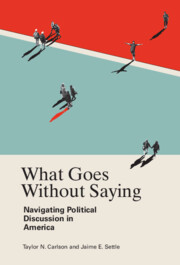Book contents
- What Goes Without Saying
- What Goes Without Saying
- Copyright page
- Contents
- Figures
- Tables
- Acknowledgements
- 1 Opening the Black Box of Political Discussion
- 2 The 4D Framework of Political Discussion
- 3 Data Collection
- 4 Detection
- 5 Decision
- 6 Discussion
- 7 [further] Discussion
- 8 Determination
- 9 Individual Dispositions and the 4D Framework
- 10 The Costs of Conversation
- Notes
- Works Cited
- Index
4 - Detection
Mapping the Political Landscape (Stage 1)
Published online by Cambridge University Press: 26 May 2022
- What Goes Without Saying
- What Goes Without Saying
- Copyright page
- Contents
- Figures
- Tables
- Acknowledgements
- 1 Opening the Black Box of Political Discussion
- 2 The 4D Framework of Political Discussion
- 3 Data Collection
- 4 Detection
- 5 Decision
- 6 Discussion
- 7 [further] Discussion
- 8 Determination
- 9 Individual Dispositions and the 4D Framework
- 10 The Costs of Conversation
- Notes
- Works Cited
- Index
Summary
Chapter 4 commences the empirical tests of our theory, beginning with Stage 1 of the 4D Framework: detection. We directly tackle a question buried implicitly in previous findings, as well as our own, that people prefer like-minded discussants: How do people detect the political views of others? The stakes of discussion may be higher in a polarized environment, but the readily available cues stemming from a divided and politicized society make the process of sorting into amicable discussions easier. We show that individuals are able to use a variety of cues to infer political leanings, including more obvious cues like demographic characteristics and extremely subtle cues, such as first names, pet preferences, and movie preferences. We then explore the existence of stereotypes that individuals hold about partisans, under the assumption that these attitudes could affect our ability to recognize others’ views and our willingness to engage in a discussion. We find that, consistent with research on affective polarization, individuals ascribe more negative personality traits to outpartisans and consider them to be ill-informed, ignorant, and overly reliant on partisan media.
Keywords
- Type
- Chapter
- Information
- What Goes Without SayingNavigating Political Discussion in America, pp. 77 - 108Publisher: Cambridge University PressPrint publication year: 2022

